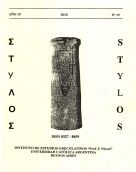Please use this identifier to cite or link to this item:
https://repositorio.uca.edu.ar/handle/123456789/4763| Título: | Duo sunt enim divinandi genera...” : pervivencia de una taxonomía clásica en un episodio del Baladro burgalés (capítulos VI-X) | Autor: | Casais, Alejandro | Palabras clave: | LITERATURA MEDIEVAL; LITERATURA FRANCESA; LITERATURA ESPAÑOLA; El Baladro de Burgos; PROFECIA; ASTROLOGIA | Fecha de publicación: | 2010 | Editorial: | Universidad Católica Argentina. Facultad de Filosofía y Letras. Instituto de estudios grecolatinos "Prof. F. Nóvoa" | Cita: | Casais, Alejandro. “”Duo sunt enim divinandi genera...” : pervivencia de una taxonomía clásica en un episodio del Baladro burgalés (capítulos VI-X)” [en línea]. Stylos, 19 (2010). Disponible en: https://repositorio.uca.edu.ar/handle/123456789/4763 | Resumen: | Resumen: En palabras de Bouché-Leclercq, la tradición grecolatina entendió la adivinación como la "connaissance de la pensée 'divine', celle-ci étant soit traduite au dehors par des signes symboliques perceptibles aux sens, soit révélée directement a1 'áme par inspiration ou émotion psychique d'origine surnaturelle"; en tal definición ya quedan perfiladas las dos especies de divinatio tradicionalmente discernidas por los antiguos: la inductiva (oionistiké; ars), en la que el adivino alcanzaba las verdades ocultas mediante la aplicación activa de una disciplina de interpretación de signos exteriores; y la intuitiva (mantiké; natura), en la que recibía pasivamente las verdades que el dios quisiera infundirle. Pensadores cristianos de la Antigüedad tardía y la Edad Media retomaron estas ideas, con sus esperables reinterpretaciones. En el presente trabajo se ilustrará la pervivencia de la aludida taxonomía en uno de los episodios iniciales del Baladro del sabio Merlín castellano, novela de caballerías impresa en Burgos en 1498 pero que traduce y reescribe dos pilares de la literatura artúrica medieval: la Historia regum Britanniae de Geoffrey de Monmouth (circa 1135) y el roman Merlín de Robert de Boron (circa 1202). Abstract: In words of Bouché-Leclercq, Greco-Roman tradition understood the divination as the "connaissance de la pensée 'divine', celle-ci étant soit traduite au dehors par des signes symboliques perceptibles aux sens, soit révélée directement al'ame par inspiration ou émotion psychique d'origine surnaturelle"; in such a definition the two species of divinatio traditionally distinguished by the ancients are already outlined: the inductive one (oionistiké; ars), in which the diviner reached the hidden truths by means of an active implementation of a discipline of interpretation of external signs; and the intuitive one (mantiké; natura), in which he passively received the truths that God would instill in him. During the Late Antiquity and Medieval Age, Christian writers considered again these ideas, with their predictable interpretations. In this paper the survival of the above-mentioned taxonomy will be illustrated in one of the initial episodes of the Castilian Baladro del sabio Merlín, novela de caballerías printed in Burgos in 1498 but that translates and rewrites two pillars of the medieval arthurian literature: the Historia regum Britanniae by Geoffrey ofMonmouth (circa 1135) and the roman Mer/ in by Robert ofBoron (circa 1202). |
URI: | https://repositorio.uca.edu.ar/handle/123456789/4763 | ISSN: | 0327-8859 | Disciplina: | LITERATURA | Derechos: | Acceso Abierto | Fuente: | Stylos Nº 19, 2010 |
| Appears in Collections: | STY - 2010 nro. 19 |
Files in This Item:
| File | Description | Size | Format | |
|---|---|---|---|---|
| duo-sunt-enim-divinidadi.pdf | 460,48 kB | Adobe PDF |  View/Open |
Page view(s)
140
checked on Apr 30, 2024
Download(s)
74
checked on Apr 30, 2024
Google ScholarTM
Check
This item is licensed under a Creative Commons License

